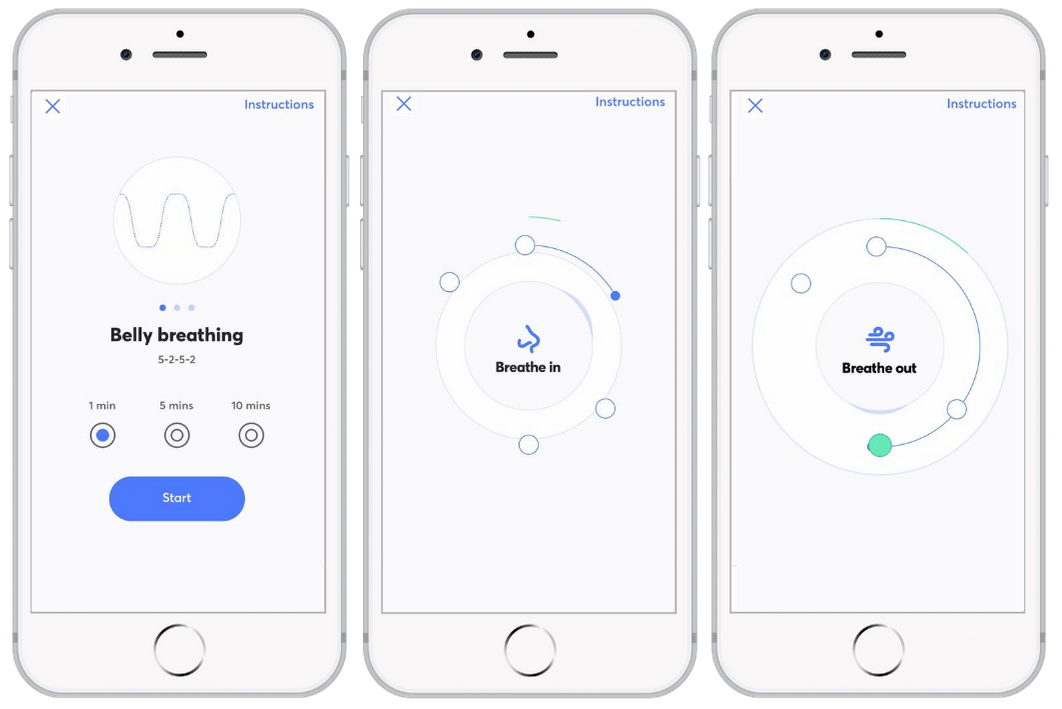The science and psychology behind Mentemia
Discover some of the research and expert thinking behind the mental wellbeing app.
The foundation of Mentemia is science, research and psychology.
Mental wellbeing is being talked about more than ever, helping spark conversations, change and helping to reduce stigma. But there’s a lot of advice out there about how to stay well. It can be overwhelming and hard to figure out what works, and if it’s actually an effective strategy.
Let’s take a look at what mental wellbeing is, Mentemia’s 6 pillars of mental wellbeing, and some of the science in the app.
Mental wellbeing is for everyone.
Mental wellbeing can be viewed as a dimension of mental health that exists on a continuum, from languishing (struggling) to flourishing (feeling good and functioning well).
This can be a helpful way to look at your mental health and how you’re doing on an ongoing basis. Think about how you are feeling today compared to the same time last week. Was it different? What were the things affecting your mental wellbeing, and what actions did you take?
We all experience ups and downs. Sometimes we face periods of high stress, like facing the impact of Covid-19 or challenges at work or home. And other times, we are thriving and things are going great.
Part of good mental wellbeing is understanding what keeps us well daily, helps us bounce back from challenges, and builds resilience.Mental wellbeing isn’t just about decreasing stress or coping with challenges. While those are very important aspects of mental wellbeing, people also want to feel happy, satisfied and thrive.
That’s why we’re working to promote positive wellbeing for everyone, with evidence-based tools and resources that can make a real difference.
6 pillars of mental wellbeing
We developed the 6 pillars of mental wellbeing to help people discover what works for them and find little things to do daily. Both help us cope with challenges and find pleasure and enjoyment in daily life.
The 6 pillars are Chill, Do, Connect, Move, and Celebrate.
Here’s what each pillar is about and why it’s good for your mental wellbeing.
Chill is all about reducing stress. It’s the things you do to calm your mind, relax your body, and switch off your fight or flight response. Did you know? You can’t be relaxed and stressed at the same time? Chilling tells your brain that it’s safe to relax.
Do is all about learning. It’s the things you do to keep your brain active and stay creative. Did you know? When you set a goal of learning something new it helps to take small steps and notice progress along the way. This strengthens brain networks that expect positive outcomes, so you’ll feel more optimistic and better about yourself.
Connect is all about connecting with and helping others. It’s the things you do to strengthen relationships, socialise, give back and volunteer. Did you know? Connecting boosts “feel good” brain chemicals oxytocin, serotonin, and dopamine. Acts of kindness and helping others is associated with feeling happier and more satisfied with life.
Move is all about keeping physically active. It’s the things you do to move your body in a way that feels good. Did you know? Keeping active improves physical health, but it’s also a way to raise your spirits. If you’re not used to doing lots of exercise, just moving a little bit can be enough to lift your mood.
Celebrate is all about taking time to celebrate and appreciate YOU. It’s the things you do to notice the positive, to be kind to yourself, and to feel good about yourself. Did you know? Evidence indicates that taking time to think kind thoughts about yourself leads to greater happiness and being better equipped to cope with stressful situations.
Enjoy is all about having things to look forward to. It’s the things you do for pleasure and fun, and to practice self-care. Did you know? Making time for pleasure, fun and laughter can help boost “feel good” brain chemicals, serotonin and endorphins. This can help you feel more upbeat for the rest of the day and more resilient in the face of stress.
In the app you can explore things to do, read or watch connected to each pillar. You can use the Dashboard in Mentemia to see what 6 pillars activity you’ve done each day. This is great to combine with using the Mood Tracker daily to get a better understanding of things that impact your mental wellbeing.
A quick look at some of the science behind the tools in the app
Mentemia is packed with evidence-based ideas and tools to help you learn how to be well, and stay well.
Our tools have all been designed to help you get real benefits for your mental wellbeing. Read on to discover how and try the tools yourself in the Training section of the Mentemia app.
Worry Map
The Worry Map in the app helps you let go of your worries and ruminating thoughts by taking control back and making a plan. Studies show that turning your worry into an action plan improves wellbeing and can reduce anxiety.
Breath Training
The Breath Training in the app can help you calm your mind, draw attention to the present, and trigger the relaxation response. Research shows that deep breathing stimulates the parasympathetic nervous system, which acts like a hand-brake on the body’s stress response.
Wheel of Kindness
By spinning the Wheel of Kindness in the app and completing random acts of kindness, you can experience the benefits of being kind. That could include improved self-esteem, strengthened social connections, feeling more connected, and increased oxytocin, serotonin and endorphins. Research shows that being kind can increase happiness. When we're kind, our brains release oxytocin — the connection hormone, and serotonin — your happy hormone.
Soundscape Mixer
Sounds can have a powerful effect on us. The Soundscape Mixer in Mentemia lets you mix your own soundscapes for calm, relaxation, focus, and sleep. Studies have shown that listening to nature sounds can have a restorative, calming effect. The researchers in these studies recommend listening to nature sounds during the day when you can’t get away from the office.
Mental wellbeing and what keeps people well is a complex and nuanced area of science.
It’s important to remember that there are many different ways of looking at wellbeing, cultural differences, and new research and ideas coming up all the time.
We hope this article gave you a bit more understanding of our approach to mental wellbeing, our strategy to help people stay well, cope better and thrive, and some of the science underpinning the content and tools in the app.
If you have any questions, let us know at support@mentemia.com or via social media.








